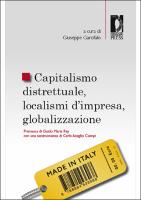Capitalismo distrettuale, localismi d'impresa, globalizzazione
Contributor(s)
GAROFALO, Giuseppe (editor)
Language
ItalianAbstract
From the late Sixties on, industrial development in Italy evolved through the spread of small and medium sized firms, aggregated in district networks, with an elevated propensity to enterprise and the marked presence of owner-families. Installed within the local systems, the industrial districts tended to simulate large-scale industry exploiting lower costs generated by factors that were not only economic. The districts are characterised in terms of territorial location (above all the thriving areas of the North-east and Centre) and sector, since they are concentrated in the "4 As" (clothing-fashion, home-decor, agri-foodstuffs, automation-mechanics), with some overlapping with "Made in Italy". How can this model be assessed? This is the crucial question in the debate on the condition and prospects of the Italian productive system between the supporters of its capacity to adapt and the critics of economic dwarfism. A dispassionate judgement suggests that the prospects of "small is beautiful" have been superseded, but that the "declinist" view, that sees only the dangers of globalisation and the IT revolution for our SMEs is risky. The concept of irreversible crisis that prevails at present is limiting, both because it is not easy either to "invent", or to copy, a model of industrialisation, and because there is space for a strategic repositioning of the district enterprises. The book develops considerations in this direction, showing how an evolution of the district model is possible, focusing on: gains in productivity, scope economies (through diversification and expansion of the range of products), flexibility of organisation, capacity to meld tradition and innovation aiming at product quality, dimensional growth of the enterprises, new forms of financing, active presence on the international markets and valorisation of the resources of the territory. It is hence necessary to reactivate the behavioural functions of the entrepreneurs.


 Download
Download Web Shop
Web Shop